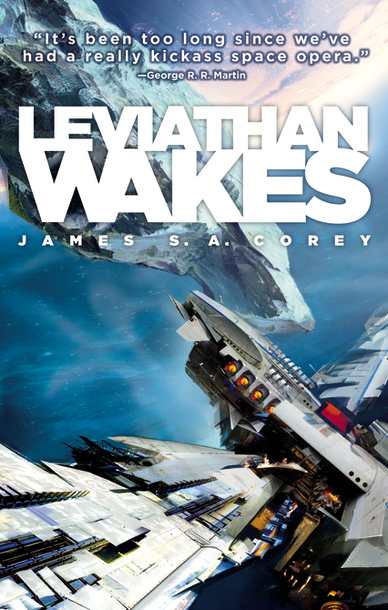Leviathan Wakes is the first of many books in the Expanse series. You may recognize the name from the Expanse TV show streaming on Amazon Prime (to the loss of SyFy who was dumb enough to let it go). I'll come back later to review the TV show, but today you get Book #1.
And I must tell you -- it's difficult for me to review this book separately from the show, as the whole overarching plot is phenomenal. After watching five seasons, I know what comes next and where this book fits in the whole scheme. So, I'm trying my hardest to ignore what I already know.
This book follows Holden and Miller as they travel across our solar system for various reasons. Holden starts on an ice trawler returning from Saturn to Ceres, and while on a shuttle, he witnesses the destruction of his own ship. Friends, loved ones, and associates he had known for years -- all dead. So, he begins a quest to find out who did this and make them pay.
Miller is a washed-up detective on Ceres who has to deal with the aftermath of the ice trawler's destruction -- in part because of the impending water shortage, but also because angers rile up. He's also asked to track down some rich guy's daughter, who's gone missing.
Holden and Miller don't realize yet, but they're really on the same mission, and something rotten is happening in the solar system. And yes -- it does involve vomit zombies. Sound crazy? Well -- it is, but it makes much more sense while reading.
And what's most awesome -- it is all mostly scientifically correct (even those vomit zombies). That is by far what attracted me to this series -- the fact that it is "real" sci-fi. Some people call this "hard" sci-fi. Think The Martian, Interstellar, or the 2001 series. "Soft" or "fake" sci-fi are other stories that only loosely use real science and just have fun with lasers and pew pew! Like Star Wars, Star Trek, and the Stargate series.
On top of this, the writers (Daniel Abraham and Ty Franck under the pseudonym of James S. A. Corey) successfully create an entire world full of politics, intrigue, and science. It feels that something like this could actually happen 100 years from now.
However, I do have to be honest. As a standalone book, I didn't find the writing too compelling. Similar to how I find George R. R. Martin's writing in his Fire and Ice books -- only George is better. And possibly similar to Orson Scott Card, who's also good at keeping the narration out of the story (which I sometimes appreciate greatly). Of these three, I find Card's writing to be best, followed by Martin, and lastly Corey.
As an aspiring writer, myself, I easily picked up on all the newbie errors: telling instead of showing, clunky dialogue, cliche F-bomb use, and so on. They also decided to alternate between Holden and Miller for each chapter throughout the entire book -- even when the two converge. I don't think I've ever seen a book do this before, and I can't decide if it's good or bad.
If I hadn't already known how great the whole story is, I might have put this book down early on. But what I did like about the writing is that is indeed very easy to read through it quickly. They do indeed do a good job of having the narration stay out of the way. I figure that regular readers won't be phased by the newbie errors and will most likely enjoy this book.
Finally, I suppose I could end with a quick comparison with the TV show. This first book covers the first two seasons -- but only from Holden's and Miller's points of view. I figure the next book or two comes back later to fill in the gaps for the many other characters who have yet to be introduced. Either that, or the show writers added in a lot of stuff for the series. In some instances scenes in the show are more fleshed out (kind of like how Jackson did a whole movie out of a few paragraphs in The Hobbit). In many instances, it felt like I was reading a script to the TV show -- indicating that some of the dialogue is indeed lifted straight from the book (including one of my favorite interactive scenes). And in a few cases, the book gave a lot more useful detail that helps explain some things not covered in the show -- which probably gave me the most value in reading this book.
There you have it -- feel free to check it out. If you stick with it, supposedly the following books get even better. I'll definitely continue chugging through, but I got a lot of other books on my list. (It never ends!)

No comments:
Post a Comment